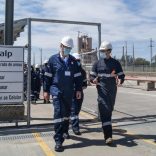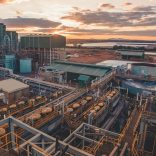Sasol Women in Accounting Programme contributes to the upskilling of Mozambique workforce
Syrah resumed graphite production in Mozambique after six months

File photo: Syrah Resources
Australian mining company Syrah announced on Thursday that it has resumed production of natural graphite at the Balama mine in northern Mozambique, which is intended for electric car batteries, after a six-month shutdown caused by social unrest.
In information sent to the markets, consulted by Lusa, Syrah explains that the “restart of production” occurred after access to the site was “restored” on May 5, following “remobilization, inspection, maintenance and preparation activities”.
“Syrah will progressively increase plant utilization and production volumes in an operational campaign to replenish the ‘stock’ of finished products in preparation for large-volume shipments. Subject to market demand, Syrah expects to continue operating Balama in campaign mode,” the information says.
He adds that “there is significant and growing latent demand for natural graphite products” that the mining company supplies, “particularly in the market outside China, due to disruptions in global supply, including those from Balama”, which is why it expects to “accelerate” deliveries in the third quarter of this year.
However, in the information released this Thursday, the mining company emphasizes that the declaration of “force majeure” – which led to the suspension of activity -, under the terms of the Balama Mining Agreement, “remains in force, pending the resumption of product shipments and a more in-depth review of the operating environment”.
The mining company announced on December 12, also in a statement to the markets, that it invoked “force majeure” due to the worsening of demonstrations and challenges to the results of the general elections of October 9, 2024 – which have already caused around 400 deaths, in addition to the destruction of public and private equipment, essentially until March -, which conditioned activity at the graphite mine in Balama.
The term “force majeure” is a legal concept that refers to external, unpredictable and unavoidable events that prevent the fulfillment of contractual obligations.
The company previously explained that the suspension of activity was due to protests at the mine, which had conditioned activity until then, and which “were ended and access to the site was restored” after the intervention of the Mozambican authorities, who removed the last “illegal protesters”.
“Following a formal agreement signed between farmers, Mozambican government authorities and the company, most of the protesters stopped the protests in Balama in April 2025. A small group of people continued to block access to the site without legitimate reason, nor any complaint against Syrah”, it previously reported.
According to Syrah, the initial dispute involved a “small group” of local farmers, with “historical grievances regarding the resettlement of agricultural land” that had not been resolved.
“Syrah continues to work proactively with the Government of Mozambique, the provincial authorities of Cabo Delgado and district and community leaders to follow up on the resettlement processes resulting from the relocated farmers and ensure continued support for the operation and free movement of goods and people to and from the Balama site, as required by the Balama Mining Agreement,” the information also reads this Thursday.
The Australian firm is building Vidalia, in the United States of America, a factory to produce material for electric car batteries, which will be powered by Mozambican ore.
Overall, graphite production in Mozambique, for electric car batteries, fell 64% in 2024, to 34,899 tons, one of the lowest records in recent years, according to government data reported by Lusa in February.












Leave a Reply
Be the First to Comment!
You must be logged in to post a comment.
You must be logged in to post a comment.